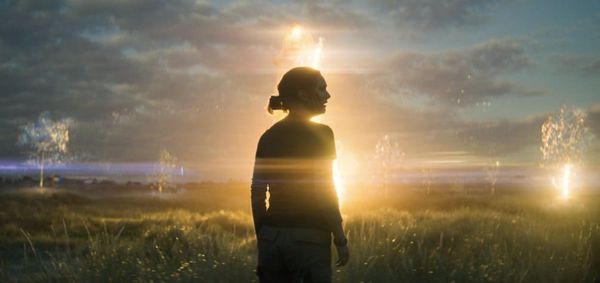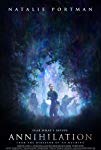Eye For Film >> Movies >> Annihilation (2018) Film Review
Annihilation
Reviewed by: Jennie Kermode

Something of a phenomenon on its release and now an unlikely awards contender (despite being seen in most countries only on the small screen), Alex Garland's Annihilation is a rare example of the sort of science fiction that does more than merely extrapolate from the known. There are shades of JG Ballard's Crystal World about it and like that author, Garland is interested in how humans behave when forced to shift their perspective on the familiar. He takes us into a world as beautiful as it is alien, a dazzling cinematic landscape that deserves to be seen on the big screen. The only problem is that, once he gets there, he doesn't really know where else to take the story.
At the centre of it all is Lena (Natalie Portman), a biologist whose husband Kane (Oscar Isaac) has gone missing in a quarantined and slowly expanding zone known as the Shimmer, where established scientific laws don't appear to work quite as they should. When he unexpectedly returns, half dead and getting worse, she joins a group of other scientists and soldiers and enters the Shimmer herself in the hope of finding something that will save him. What follows is part standard military unit in hostile territory action drama and part mystery, with assorted team members making unexpected discoveries about the altered landscape and attempting to piece together what's going on.

Much has been made of the fact that team we follow is all-female, but this has little to do with the plot and little bearing on how the story develops. Garland's focus seems to have been chiefly on finding the right actors, with some strong performances on display even where characters are thinly drawn. The meatiest role goes, as it probably should, to Jennifer Jason Leigh as the psychologist with a secret. In keeping with cinema's general approach to members of her profession, there is an implication that she's using her esoteric knowledge to manipulate the other members of the group, but she's a good enough actress that she manages to convince as someone who believes in the ethics of her actions throughout.
Concept aside, it's Mark Digby's production design and Rob Hardy's cinematography that really make the film, along with an atmospheric score by Ben Salisbury and Portishead's Geoff Barrow. Together they give Annihilation a highly distinctive character that won't be easily forgotten, even if there is some overlap with the visual design work in Carolina Hellsgård's more narratively sophisticated Ever After (one of those cases of separate creative teams developing similar ideas in confluence). The effect has something in common with early cinema: we are watching not so much for a story as for an experience.
This is fortunate because story-wise it all goes a bit Event Horizon towards the end Garland having written himself into a corner and trying to get out by piling on revelations that don't actually tell us anything. You'll enjoy this better if you don't think too hard. Nevertheless, Annihilation is a bold and vibrant piece of work, and if more filmmakers were willing to risk biting off more than they could chew, cinema would be richer for it.
Reviewed on: 31 Dec 2018















